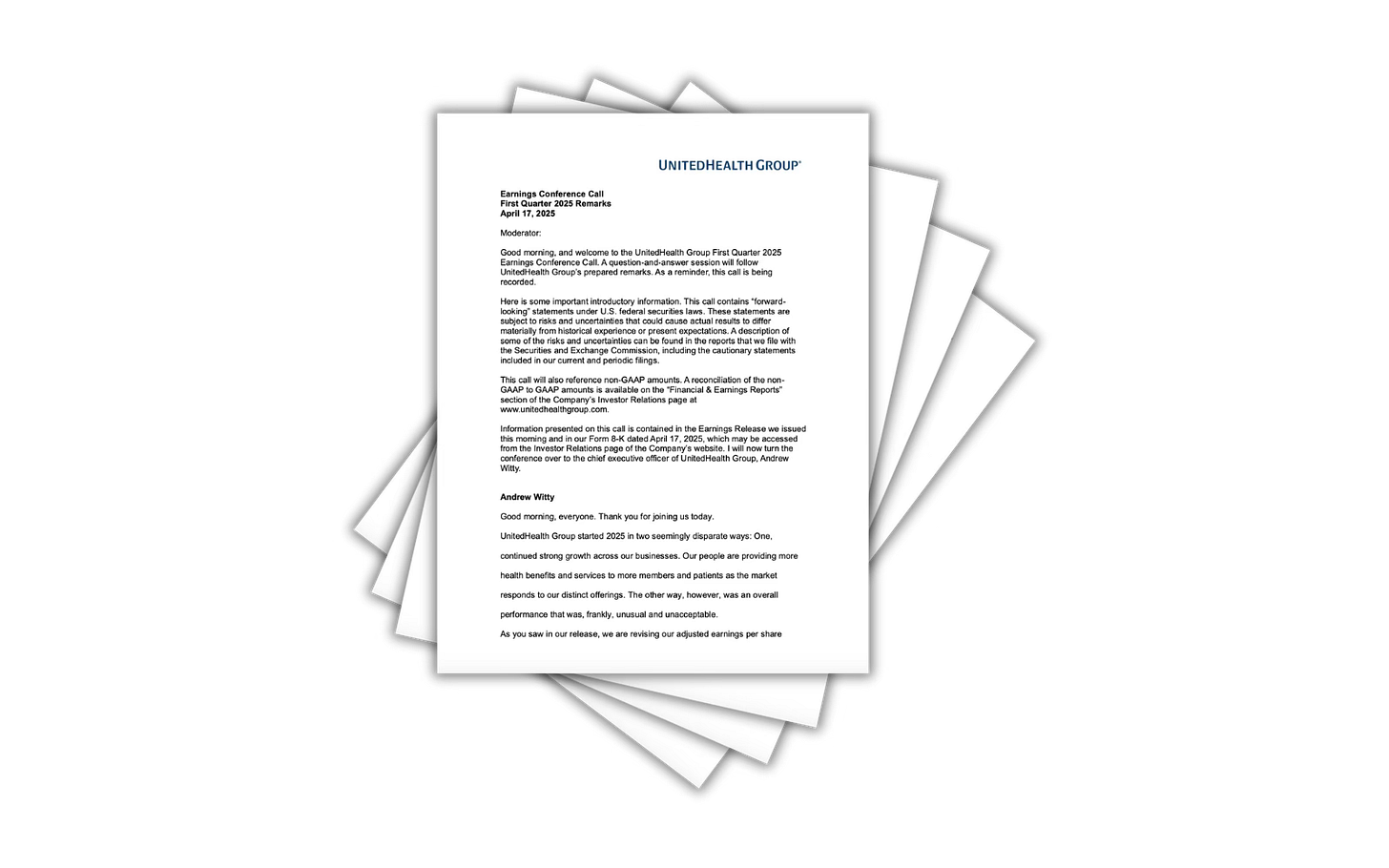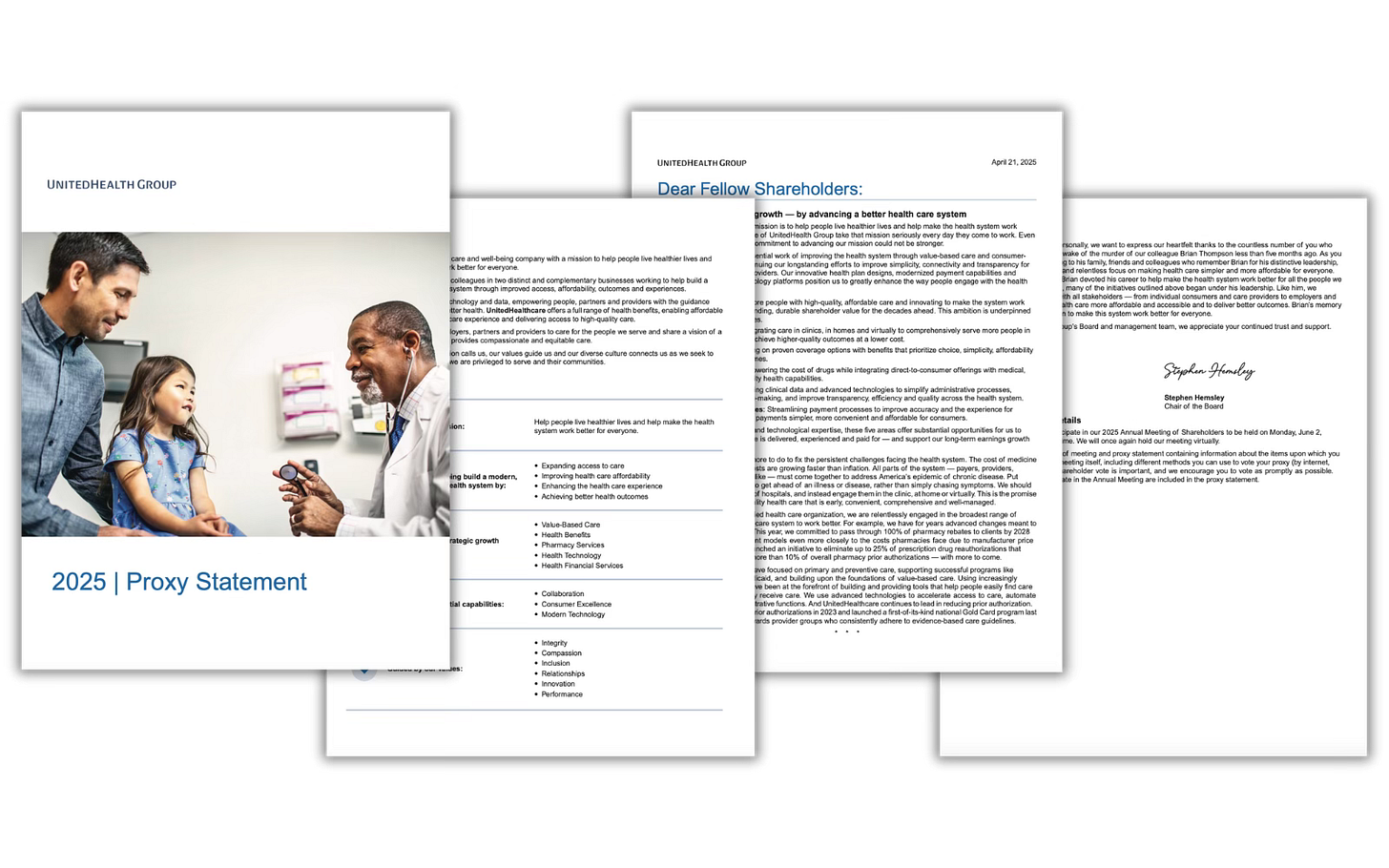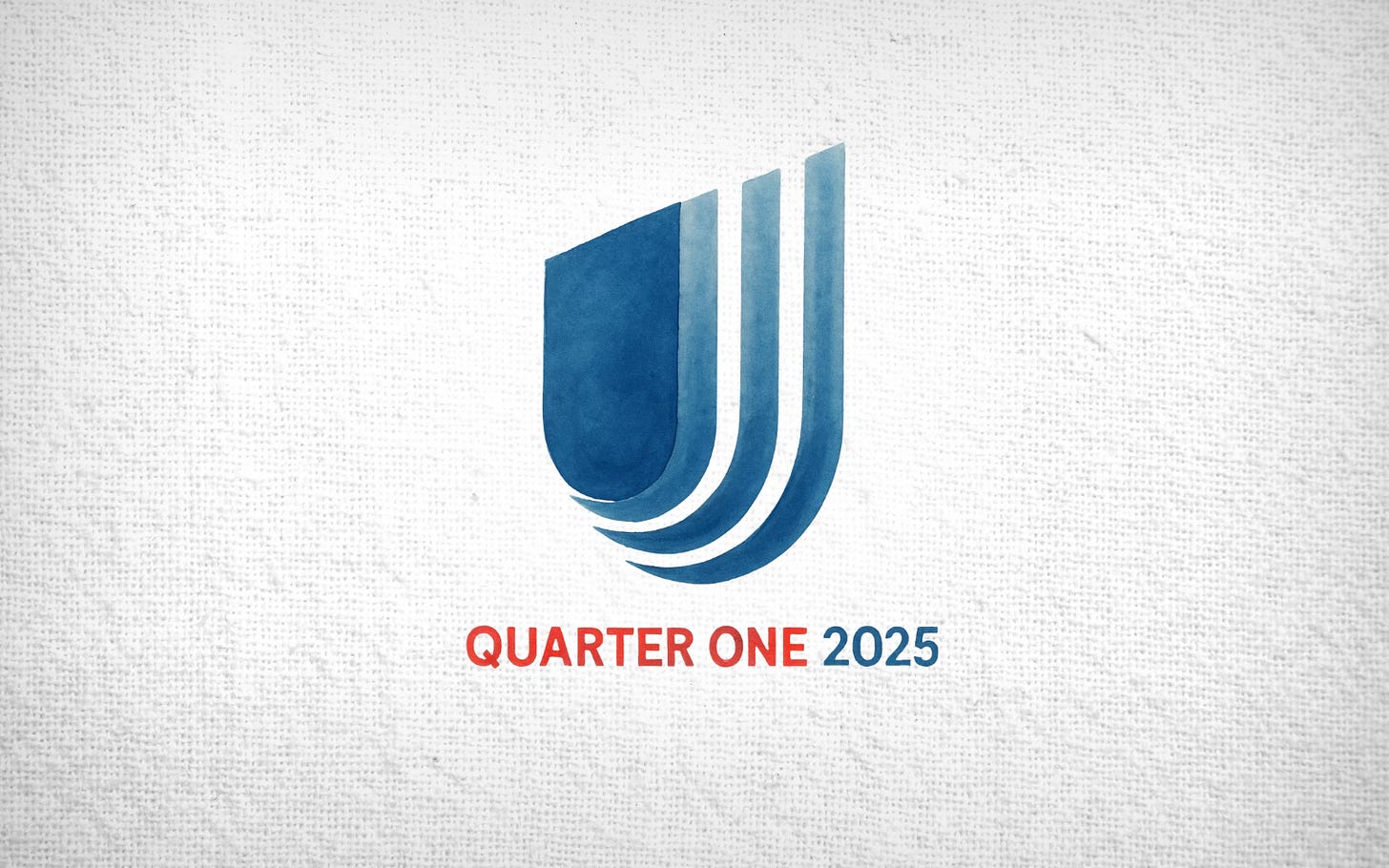UnitedHealth Group’s $9.1 Billion First Quarter Wasn’t Enough to Keep Wall Street Happy
Wall Street punished the health care giant for lowering 2025 profit expectations — even after it reported record earnings.
UnitedHealth Group’s stock price has been in free fall since it announced first-quarter 2025 earnings last Thursday, but not because the company failed to report huge profits during the first three months of the year.
In fact, the nation’s largest insurer – and the world’s largest health care conglomerate – posted record-breaking profits of $9.1 billion during the first three months of this year, considerably more than the $7.9 billion it made in the first quarter of 2024.
A $110 Billion Meltdown in a Single Day
Despite those impressive gains, the stock price dropped an astonishing 22% during the day on Thursday, which, according to Bloomberg’s John Tozzi, was the biggest decline in 26 years. Here’s another way of looking at that collapse: UnitedHealth lost $110 billion in market capitalization in a single day.
The stock price slid an additional 6.34% on Monday. (The market was closed on Good Friday.) While the stock inched up a tiny bit yesterday (.43%, to $427.18 a share) as the overall market rallied, the company’s executives clearly are having difficulty assuring investors that UnitedHealth is a good place to park their money right now.

So what’s going on? The company’s sin – its cardinal sin – was to tell its shareholders that it likely will not make as much money for them in 2025 as it had thought as recently as January.
Folks, when it comes to a corporation’s stock price, it is all about expectations. It is not just about how much you make in profits that matters most to your shareholders, it’s about what you tell them to expect for the future.
Just before UnitedHealth’s annual “investor day” in New York on December 4, the company said it expected to earn between $28.15 and $28.65 per share in 2025. It reaffirmed that range when it announced its expectations for full-year 2025 earnings in January. But on Thursday, the company revised those numbers downward, considerably, to between $24.65 and $25.15 per share.
That is what sent investors running for the exits. By the time trading ended on the New York Stock Exchange at 4 p.m. Thursday, 20 million shares of the company’s stock had been traded, far more than usual.
The Medicare Advantage Hangover
The company’s executives complained during their call with Wall Street financial analysts on Thursday morning that many of the people enrolled in the company’s Medicare Advantage plans used more health care than the executives had expected, especially those who enrolled for the first time in a UnitedHealth/AARP plan last fall. And they complained about the smaller-than-expected increase in Medicare Advantage payments authorized by the Biden administration for 2025. But the reality is that UnitedHealth has succeeded brilliantly in capturing a large percentage of the new enrollees in Medicare Advantage over the past several years, and the company is now finding there were greater risks than its executives imagined in signing up everybody who applied.

The company made a huge bet on Medicare Advantage several years ago – and also on Medicaid – and has seen big increases in payments from the government over the years. Those government programs have been the company’s golden goose for a long time now, but that goose might be losing some of its luster.
Enrollment in the company’s private-paying commercial health insurance business – through employer-sponsored plans and individuals buying coverage through the Obamacare marketplaces – has grown only modestly over the past decade. In fact, the company had fewer Obamacare enrollees this past quarter than a year ago. As UnitedHealth CFO John Rex explained, “commercial insured membership was impacted by the individual exchange products. Our disciplined pricing approach remains consistent and as a result, we experienced some member attrition.” (Translation: The company raised premiums on the Obamacare enrollees who were costing them the most, and the higher premiums caused people to shop elsewhere or go uninsured.)
By contrast, enrollment in the company’s Medicare Advantage plans and in the Medicaid programs it administers for nearly half of the states, has exploded in recent years, to the point that 77% of the company’s health plan revenues now come from those government programs. This is despite the fact that 30 million people are enrolled in its commercial plans while a little more than half that number are enrolled in its Medicare Advantage and Medicaid plans (8.2 million and 7.6 million respectively).
This is what happens when you put the needs of investors before the needs of patients and taxpayers. And to get back into Wall Street’s good graces, you can expect the company to make it even more difficult for people enrolled in its Medicare Advantage plans to get the care they need, and for it to spend enormous amounts of money to keep lawmakers from cracking down on the massive overpayments the federal government makes annually to insurers participating in the Medicare Advantage program.
Blame the Seniors — And Blame the Government Too
Even before taking the first question from Wall Street analysts last Thursday, UnitedHealth CEO Andrew Witty, knowing the analysts and shareholders would be surprised to see the lowered earnings expectations for the year, assured them that the company’s “respective teams are urgently responding to our performance challenges.”
He later went on to throw shade on the Medicare Advantage enrollees the company picked up from the purging Humana, Aetna and Cigna did last year. Those companies cut more than half a million of their Medicare Advantage enrollees loose by leaving many of the communities they previously had served. By exiting those markets, those insurers cut their less profitable seniors adrift, and many of them enrolled in a UnitedHealth plan for 2025. “A portion” of UnitedHealth’s new Medicare Advantage enrollees, Witty said, “were covered by plans that were exiting markets. They experienced a surprising lack of engagement last year, which led to 2025 reimbursement levels well below what we would expect.” (Translation: If they had been enrolled in one of our plans, we would have charged the government more than our competitors did by dialing up the coding intensity apparatus in the MA program. Insurers get more money from taxpayers by claiming their enrollees’ health is not so good; the government pays insurers more for allegedly sicker MA enrollees.) UnitedHealth’s executives assured investors they would get on top of that right away to grab more of our tax dollars going forward.
Profits Fall, But the Paychecks Don’t
To put UnitedHealth's recent misfortune on Wall Street in a historical perspective, keep in mind that the company’s stock reached an all-time high of $630.73 on November 11, 2024, a few days after the last election, Since then, the company’s stock has lost 33% of its value. Yes, the overall market has also fallen since the election, but not nearly as much. The Dow Jones Average was $44,293.13 on November 11, 2024. It closed Monday at $38,120.41, down 13.93%. Yes, that’s a lot. But not nearly as much as UnitedHealth’s stock price.

In other news, UnitedHealth released its annual report and proxy this week, showing that the company paid Witty $26.3 million last year, up from the $23.5 million he made in 2023. (Note that likely doesn’t account for actual realized gains from the UnitedHealth stock in his compensation portfolio. Also know that Witty is paid mostly in stock, which puts his total compensation at risk: it rises when the stock is doing well and falls when it isn’t. Consequently, his net worth took a significant hit last Thursday.). I’ll write more about executive compensation in the health insurance game in the coming weeks.





Shows more and more that vertically integrated healthcare is not a healthcare business at all.
Rather, it's a money game and when shareholders (BlackRock, etc.) become unhappy with results......well, we all see the share value plummet. Profiteering disguised as healthcare.
We got notice a few days ago that my husbands UHC Medicare supplement costs (Medigap) for 2026 is going up 17%. For 2025 it increased 6%. How does one do financial planning for retirement with these kinds of outsized increases that are not in line with COL/inflation? I hate UHC. THANKS WENDELL FOR THE WORK YOU DO and explaining everything so well!